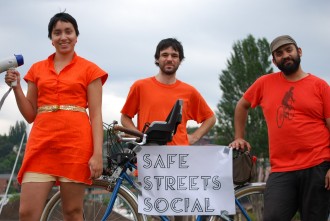
Josh Cohen at The Bicycle Story recently interviewed Adonia Lugo, a friend, bicycle anthropologist and all-around bad ass who lives on Capitol Hill.
Chatting and working with Adonia and Davey Oil (who blogs at Riding on Roadways) has done a lot to develop how I see the role of cycling in our city. The two of them do brilliant work trying to figure out how bicycling and social justice work together, a connection that too often goes ignored or unaddressed in Seattle.
Adonia studies the concept of “human infrastructure” as it relates to bicycling. In short, just like physical infrastructure can help people navigate cities on bikes, she studies the social supports that make cycling possible and inviting in a community.
CicLAvia, which she co-founded, is a massive people-powered street party in which 100,000+ Los Angelinos bike, walk and play along a route of usually-car-clogged streets. On one level, it’s an urban celebration and demonstration that streets are places for people, not just pipes for cars (to steal a phrase from SDOT Director Peter Hahn). On another, it’s an empowering experience for many people who may have previously considered bicycling in the city unappealing or difficult to navigate. Here they are, surrounded by their community, biking through neighborhoods and downtown LA.
Seattle is very different than LA, for better and worse. In the interview, Adonia talks about the Seattle Bike Justice Project and shares some thoughts on how Seattle can create a better bicycling community.
An excerpt from The Bicycle Story:
Clearly equity is an important part of your project and your work. What does it mean to have equity in the bicycling community?
I’m coming from a perspective of doing community-based, participatory research and the core idea of that is that as a researcher you don’t come into a place with an idea in mind of what you’re going to do, then use research to support that idea. It’s about building research projects through participation with people in order to be able to address their concerns. So, I experienced that bicycling is a community-building tool.CicLAvia is a really great example of how people riding their bikes in the street can feel really good doing it. And they feel better about their city. It’s been really amazing hearing people say they never thought they could feel this good in LA or experience LA like this.
My work is to try and promote the idea of bicycling as a community-building tool. Bicycling is not just health, it’s not just recreation, it’s not just about improving some neighborhood or other. It’s about bringing together different types of people. And right now bicycling is dividing people rather than bringing them together. For me equity means taking multiple perspectives into consideration and working with a coalition of people to define what bicycling is going to mean for America.








Comments
3 responses to “The Bicycle Story: Adonia Lugo talks transportation equity”
I love those guys!
I think I’m a pretty good ass, actually. Hee haw! P.S. you guys are my favorites.
[…] explores the primal impulses that can cause parking discussions to become so irrational. And Seattle Bike Blog considers the “human infrastructure” that undergirds […]